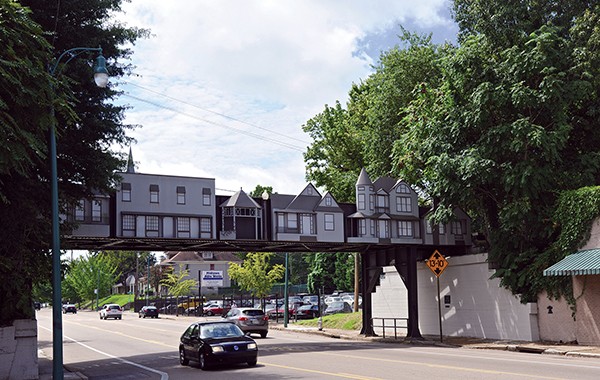We Love (Some of) Memphis.
That’s the message I got after reading about recent developments from the Cooper-Young Neighborhood Watch. Earlier this year, the Cooper-Young Business Association partnered with the Shelby County District Attorney’s office in its “anti-trespassing program.” The program, which started from the DA’s office to “discourage incidents of loitering and criminal trespass” in apartment complexes, has expanded to cover commercial properties and now has over a dozen businesses signed up in the Cooper-Young area.
For businesses who participate in the program, this means that the police are given authorization of agency. Authorization of agency would typically require businesses to fill out a form against specifically named persons outlining that they are not allowed on property or else they will be charged with criminal trespassing. This program throws all of that out the window. Without warning, people can be arrested for criminal trespassing on first offense. Anyone can use their judgment to deem someone of trespassing, and the police can make arrests with or without a complaint made. Does that sound familiar? Targeting a person because you think they might commit a crime. Anyone? What is profiling?
 Calvin Leake | Dreamstime.com
Calvin Leake | Dreamstime.com
Cooper-Young
Correct. Programs like these that have been implemented around the country and in our city result in assuming certain behaviors are criminal behaviors. We then don’t see people as people, rather we assign them a role as criminals. Take the humanity out of a person and it becomes easier to isolate and incarcerate the body. Black and brown folks, especially men, are often targeted because the pigment in their skin does not fall within the spectrum of the predominantly white demographic of Cooper-Young. If you aren’t aware of this pattern of implicit, and sometimes explicit, bias, then you probably haven’t checked what your neighbor down the road has been posting on Nextdoor.com.
A couple of “shady” folks standing near your favorite coffee-yoga-organic-craft brewery during your happy hour? Sit down, Carol. There’s nothing incriminating about standing or talking. In fact, they probably know the neighborhood better than you. It’s this simple judgment that can now have severe results for folks of color engaging with police.
This isn’t the first time that such programs and ordinances regulating urban space have been enforced. We’ve seen it happen in almost every corner of “revitalized” Memphis space — from downtown, Crosstown, and Overton Square to the Edge District and University District. It doesn’t stop at the moving or closing of local businesses owned by people of color who attract the “wrong” crowd. It spreads to a structural separation of people and communities. Just take a look at how we’ve cut bus lines and frequency and don’t fix bus shelters but yet we paint our street lanes green for the urban cyclist.
There is nothing proactive about this as an approach to address crime. A proactive approach would be one that would assess and address the needs of the population that is facing chronic hunger and/or homelessness. It would challenge loitering prohibitions as restrictions to people’s right to move freely in public space. It would critically engage with solutions to address homelessness and its causes (low wages, lack of affordable housing, etc.). A proactive approach would be not just speaking on these issues when they hit the news, but actively investing in programming that would support individuals as they work to find stable jobs and housing. While Memphis is a city with one of the lowest costs of living, people cannot make it on $7.25 an hour.
Programs such as these ultimately reflect a neglect in the framing of the future for Memphis. When we are creating this Memphis, who is it for? And at whose expense? Are we prioritizing certain people’s comfort and in exchange suppressing the freedom and autonomy of others? The decisions made in Cooper-Young as well as in Overton Square and the Crosstown neighborhood give us a peek into some of these answers. How we police public streets and how we decide who gets to walk on those same roads will show the world whether we are moving forward or backward, and once we put up these signs claiming land for a certain group of people and intimidating others with criminal charges, we send a clear message.
As we reimagine and reshape urban space, we need to be critical of ourselves and our practices that exclude and literally push out people to the margins. Our actions are all connected, and what decisions we choose to support and call out will put us in history as community-builders or as complacent agents in the uprooting of communities.
We cannot convince ourselves that we are uplifting the city when we are simultaneously destroying opportunities for some and denying fellow Memphians access to a space in our envisioned future.
Aylen Mercado is a brown, queer, Latinx chingona and Memphian pursuing an Urban Studies and Latin American and Latinx Studies degree at Rhodes College. A native of Argentina, she is researching Latinx identity in the South.